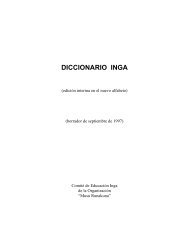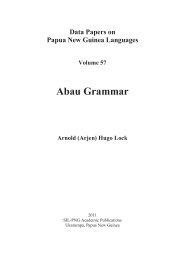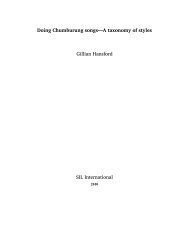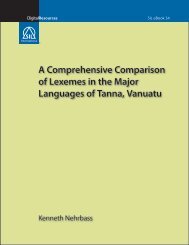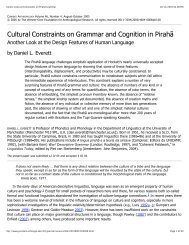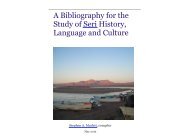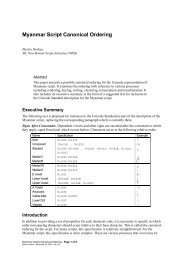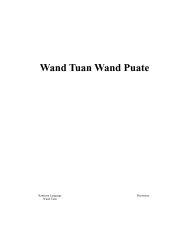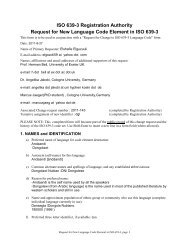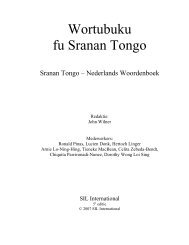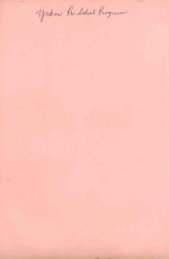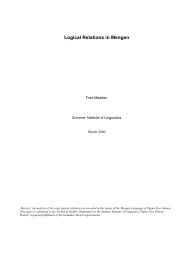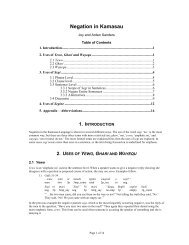- Page 1 and 2: DigitalResources SIL eBook 33 ® Th
- Page 3 and 4: Fair-Use Policy: SIL e-Books 33 ©2
- Page 5 and 6: 5.3.2 A unified Bidayuh orthography
- Page 7 and 8: 6.5.1 Developments from medial clus
- Page 9 and 10: 5.1.1 Onset of the ultima 5.1.2 Nuc
- Page 11 and 12: Foreword Y. B. Datuk Michael Manyin
- Page 13 and 14: Introduction to Part I Today more a
- Page 15 and 16: xiv The Bidayuh Language: Yesterday
- Page 17 and 18: xiv The Bidayuh Language: Yesterday
- Page 19 and 20: 1 Who are the Bidayuh? The non-Musl
- Page 21 and 22: 1.1.1 By location Before the coming
- Page 23 and 24: 2 Language development before 1963
- Page 25 and 26: the Bidayuh belt make use of the re
- Page 27 and 28: mile of the Kuching-Serian road. Al
- Page 29 and 30: 3 Language development after 1963 M
- Page 31: However, when the Dewan Bahasa dan
- Page 35 and 36: 4 Recent efforts to develop the Bid
- Page 37 and 38: 5 The Bidayuh Language Development
- Page 39 and 40: Table 3. Current and unified symbol
- Page 41 and 42: � It would be a source for lingui
- Page 43 and 44: eing of the Bidayuh language but al
- Page 45 and 46: 8 Addendum — Events since 2005 Th
- Page 47 and 48: 8.6 Wordlist project This is a cont
- Page 49 and 50: 1 Introduction The intent of this p
- Page 51 and 52: nasal(ized) sounds. There are some
- Page 53 and 54: Vowels of the ultima (tonic syllabl
- Page 55 and 56: 3.2.4 There are two laryngeal phone
- Page 57 and 58: Curly brackets: {bi-} in /bi-suwat/
- Page 59 and 60: Thus, [ã], [ũ], [ỹ], [h̃]; [V
- Page 61 and 62: Examples of nasally-released word-f
- Page 63 and 64: 4 Canonical shapes of Bidayuh words
- Page 65 and 66: Examples of ambisyllabic V 1.V 2 se
- Page 67 and 68: different meaning from the form wit
- Page 69 and 70: saktian/ ‘a supernatural power th
- Page 71 and 72: Still another example of phonetic v
- Page 73 and 74: —or possibly /r/ is the remnant o
- Page 75 and 76: Possibly words like /uatki/ > [ʔwa
- Page 77 and 78: 5 Nasal spread 35 Movements of the
- Page 79 and 80: piŋayuh/ > [pi.ŋã.ỹũh̃] ‘c
- Page 81 and 82: təŋən/ > [tɤ.ŋɤ̃n] ‘tree (
- Page 83 and 84:
Reverse spread is more likely to oc
- Page 85 and 86:
words affected by this weakening pr
- Page 87 and 88:
5.5 Outcomes of nasal+obstruent clu
- Page 89 and 90:
6 ‘New’ nasality As may be conc
- Page 91 and 92:
obstruent has dropped out in partic
- Page 93 and 94:
clusters (…VN.DV…). However, Bu
- Page 95 and 96:
Examples of the reported increase i
- Page 97 and 98:
nasal spread—i.e., it occurs in w
- Page 99 and 100:
The following examples illustrate n
- Page 101 and 102:
saNɡaap/ > *sə̃.ŋ(ɡ)a.ˈap > [
- Page 103 and 104:
with instances of non-spread. Such
- Page 105 and 106:
A vowel between two simple/single n
- Page 107 and 108:
6.7.2 Environments that hinder or p
- Page 109 and 110:
7 Nasals in Bidayuh morphology What
- Page 111 and 112:
7.2 Elements of Bidayuh morphology
- Page 113 and 114:
tānək/ ‘cook (it)! (imperative)
- Page 115 and 116:
ut also the grammatical content of
- Page 117 and 118:
ɡāyas/ > [ɡā.yəs] ‘scratch!
- Page 119 and 120:
install’ (Biatah-Nais). /pĭjo(ː
- Page 121 and 122:
Examples of Bukar and Sadung roots
- Page 123 and 124:
complex than, for example, a vowel-
- Page 125 and 126:
) /m-/ is another single-consonant
- Page 127 and 128:
im-/ occur most commonly with /k/-i
- Page 129 and 130:
udip/ 103 ‘alive, living, fresh;
- Page 131 and 132:
knowledge, there is only one third-
- Page 133 and 134:
third order. 109 Consonant-initial
- Page 135 and 136:
It is not absolutely clear whether
- Page 137 and 138:
or the single-consonant prefix /m-/
- Page 139 and 140:
Table 3. Distribution of six common
- Page 141 and 142:
Table 4. Estimated level of product
- Page 143 and 144:
) Canonical type of the first sound
- Page 145 and 146:
8 Closing remarks This paper provid
- Page 147 and 148:
1 Overview It has long been recogni
- Page 149 and 150:
For those who would like to relate
- Page 151 and 152:
3. In most dialects there is (or ma
- Page 153 and 154:
lengthening of the following conson
- Page 155 and 156:
*t *k Additional examples: *ŋum-p
- Page 157 and 158:
*m *n *ɲ *ŭməh, *ăməh ‘(padd
- Page 159 and 160:
*y *s Sembaan kăwin, Tringgus Raya
- Page 161 and 162:
*dĭ-ken, *dĭ-ɡen ‘hold in hand
- Page 163 and 164:
shape in Malay words and (2) the ma
- Page 165 and 166:
*e *o *a Biya tājə, Sembaan tāj
- Page 167 and 168:
Sembaan. In general, in Sembaan the
- Page 169 and 170:
*mideːk, *mŭdeːk ‘go upriver
- Page 171 and 172:
Three more sets seem to provide evi
- Page 173 and 174:
Also *kĭlet, *kĭlat ‘eyelashes,
- Page 175 and 176:
*kăʔih, *kiʔeh ‘we (exclusive)
- Page 177 and 178:
Pinyawa’ dəwən, Bengoh dəwən,
- Page 179 and 180:
Tringgus Raya trən, Tringgus Biren
- Page 181 and 182:
*ɲəhəp ‘suck’ > Singai ɲuop
- Page 183 and 184:
*m *n *ŋ *l *r *bāʔak tuad Bukar
- Page 185 and 186:
speakers, Pinyawa’ and Bengoh whe
- Page 187 and 188:
*ăndu ‘day’ Singai əndu, Gumb
- Page 189 and 190:
*kăwi, *kăwin ‘shoulder, clavic
- Page 191 and 192:
Key to dialect numbers: Western Cen
- Page 193 and 194:
Table 5. Distribution of Replacive
- Page 195 and 196:
*jāmban (74) əʔ əʔ *tăŋan (1
- Page 197 and 198:
Table 7. Distribution of Replacive
- Page 199 and 200:
*t *k Bibengih mpuruh, Sangking mpu
- Page 201 and 202:
Anah Rais ɲiʔit, Biya ɲīʔit, S
- Page 203 and 204:
*jăran, *ăran ‘trail, footpath
- Page 205 and 206:
Table 8. Proto-Bidayuh penult vowel
- Page 207 and 208:
*ătək, *ə̆ntək ‘brain’ Sin
- Page 209 and 210:
*siməhəŋ, *simăhoŋ ‘ten’ S
- Page 211 and 212:
mə̆kəd, Tringgus Bireng məkəd,
- Page 213 and 214:
*săʔə, *siʔə ‘kill’ Grogo
- Page 215 and 216:
də̆ŋan, Tringgus Bireng dĭŋeː
- Page 217 and 218:
*ɲinsap ‘suck’ hisap *sinsin
- Page 219 and 220:
*t *k *b *ɡ *r *s Anah Rais prĭʔ
- Page 221 and 222:
Tringgus Raya kāsah, Tebakang kir
- Page 223 and 224:
2.6.1 Consonants Proto Bidayuh had
- Page 225 and 226:
Singai Sin Bratak 78.8 Bra Table 9.
- Page 227 and 228:
Proto Land Dayak Bidayuh Bakati Bak
- Page 229 and 230:
*t *k *b *d *j *ɡ *m *n *ɲ *ŋ *l
- Page 231 and 232:
*[d]iu 1ʔ ‘true’ Rara diyuʔ,
- Page 233 and 234:
correspondences for the vowel *a ar
- Page 235 and 236:
*ara 1d ‘wing’ Rara arat, Sara/
- Page 237 and 238:
There is a small group of words tha
- Page 239 and 240:
*j *ɡ *m *n *ɲ *ŋ *l *r *s *jaŋ
- Page 241 and 242:
3.2.3 Coda of the penult Only nasal
- Page 243 and 244:
4 Proto Bidayuh-Bakati’ The Biday
- Page 245 and 246:
For the present we will posit PBB *
- Page 247 and 248:
*mbeen ‘wash (hands)’ PBid *ŋu
- Page 249 and 250:
*sVbərək ‘hungry’ PBid *sibə
- Page 251 and 252:
chart: The usual correspondences fo
- Page 253 and 254:
*ɡăɡah ‘strong (person)’ PBi
- Page 255 and 256:
However, other alternations include
- Page 257 and 258:
*năŋko ‘steal’ PBid *năŋku,
- Page 259 and 260:
If the following Bidayuh and Bakati
- Page 261 and 262:
**k ** ĭkan ‘fish’ Proto Biday
- Page 263 and 264:
It seems probable that only **r is
- Page 265 and 266:
**s **kăsuh ‘dog’ Proto Bidayu
- Page 267 and 268:
These Southern Land Dayak forms see
- Page 269 and 270:
**kămbət, **k-ar-ĭmbət, **k-an-
- Page 271 and 272:
position usually occur before voice
- Page 273 and 274:
e reconstructed for these sets or e
- Page 275 and 276:
As can be observed from the precedi
- Page 277 and 278:
Even in Proto Bidayuh in a high pro
- Page 279 and 280:
5.1.2.5 Vocalic length The data fro
- Page 281 and 282:
**tərəp, **t/dărəm ‘deep’ P
- Page 283 and 284:
**ăpuy, **ăpi ‘fire’ Proto Bi
- Page 285 and 286:
**p **piʔin, **paʔin ‘water’
- Page 287 and 288:
**m-i/ŭ/ādip ‘alive’ Proto Bi
- Page 289 and 290:
**ŭduh, **iduh ‘grass’ Proto B
- Page 291 and 292:
**ŭ ̆̆ ̆ **ŭjan ‘rain’ Pr
- Page 293 and 294:
Examples of sə, bə and po are fou
- Page 295 and 296:
It is possible that Proto Land Daya
- Page 297 and 298:
6 Roots of the Land Dayak languages
- Page 299 and 300:
PPhil *ləpád, PLD *măbər, *mibi
- Page 301 and 302:
PAN *l > *r PAN *limáH > PLD *rim
- Page 303 and 304:
PLD laryngeals. Since the developme
- Page 305 and 306:
PHF *besúR ‘full, sated > PLD *b
- Page 307 and 308:
PHN *suŋay > PLD *sūŋi ‘river
- Page 309 and 310:
Bengoh taːs, Anah Rais taːs, Biya
- Page 311 and 312:
PHN (Z) *ubú[qʔ] ‘short’ (296
- Page 313 and 314:
PAN *kálih ‘dig (out)’ > PBB *
- Page 315 and 316:
*măriʔ, *pāriʔ ‘go back, retu
- Page 317 and 318:
A. Table 19. Distribution of Sound
- Page 319 and 320:
3. The contrast between full and re
- Page 321 and 322:
**kăjaʔ ‘leg’ Proto Bidayuh *
- Page 323 and 324:
**ridiʔ, **radiʔ ‘thin’ Proto
- Page 325 and 326:
Another change (Group F) has affect
- Page 327 and 328:
**tăkiʔ ‘excrement’ Proto Bid
- Page 329 and 330:
7 A final word In these pages we ha
- Page 331 and 332:
Serasot batuh, Grogo batuh, Stass b
- Page 333 and 334:
Proto Bakati’ *ampun ‘cloud’
- Page 335 and 336:
Proto Bakati’ *sawa 1ʔ ‘year
- Page 337 and 338:
təŋən (kəyuh), təŋəy, Bratak
- Page 339 and 340:
PHN *balat ‘banana species’ (co
- Page 341 and 342:
manuk (ʔ is the more common reflex
- Page 343 and 344:
Bukar-Sadong siok [siyɔk], Bunan s
- Page 345 and 346:
Rara kampawaʔ ‘spider’. Ribun-
- Page 347 and 348:
mbak, Biatah ubak, Bistaang baːk,
- Page 349 and 350:
Tebakang pămpi, Bukar-Sadong pămp
- Page 351 and 352:
Proto Land Dayak **isuk Proto Biday
- Page 353 and 354:
Proto Bidayuh *pŭduh, *pudun ‘ga
- Page 355 and 356:
unclear whether these forms reflect
- Page 357 and 358:
Proto Bakati’ *ŋayo 2 ‘scratch
- Page 359 and 360:
Proto Bakati’ *[m]uɲu 1ŋ ‘sit
- Page 361 and 362:
Biatah aran, Bistaang ran, Benuk (a
- Page 363 and 364:
Proto Bidayuh *jătuːʔ ‘fall’
- Page 365 and 366:
PMP *Ra-[n]+dut ‘pull out’ Prot
- Page 367 and 368:
Proto Bidayuh *ku/ŋi/ni-suː̼ ̼
- Page 369 and 370:
mamuh, Biatah māmuh, Bistaang mām
- Page 371 and 372:
Proto Bakati’ *ɡulu 1k ‘laugh
- Page 373 and 374:
PMP *uDahik ‘go upstream’ Proto
- Page 375 and 376:
Rais dăyəh, Tringgus Bireng dăy
- Page 377 and 378:
Serambu sipot, Bratak sipot, Seraso
- Page 379 and 380:
Bibengih pădi, Sangking isih pădi
- Page 381 and 382:
sănduk, Bibengih sănduk, Sangking
- Page 383 and 384:
Serasot ɲuop, Grogo ɲuop, Stass
- Page 385 and 386:
PAN (D) *musipa ‘chew betel’, P
- Page 387 and 388:
Proto Land Dayak **dāyuŋ Proto Bi
- Page 389 and 390:
Tringgus Raya mīrih, Tringgus Bire
- Page 391 and 392:
Proto Bidayuh *ănjan ‘ladder’
- Page 393 and 394:
dukoh, Ribun-A duku a h, Semandang
- Page 395 and 396:
Proto Bakati’ *saribu 1 ‘one th
- Page 397 and 398:
Proto Bakati’ *aŋho 2 ‘long’
- Page 399 and 400:
Proto Bakati’ *sunu 1 ‘dull’
- Page 401 and 402:
Proto Land Dayak **insək, **in[s]i
- Page 403 and 404:
Tringgus Raya ɲama, Tringgus Biren
- Page 405 and 406:
kudu, Biatah kudu, Bistaang kădu,
- Page 407 and 408:
PAN *kamí Proto Bidayuh-Bakati’
- Page 409 and 410:
məndam, Biatah birăndam, Sapug m
- Page 411 and 412:
Proto Bakati’ *ka sada 1n ‘insi
- Page 413 and 414:
Proto Bidayuh-Bakati’ *bădaʔ Pr
- Page 415 and 416:
*băɡəːʔ many (things) (299) *b
- Page 417 and 418:
*jan, *ăjan, *ijan, *ŭjan, *jen,
- Page 419 and 420:
*mūsiŋ, *pūsiŋ, *pūsin, *mūsi
- Page 421 and 422:
*sădeʔ, *sĭdeʔ, *sudiʔ, *sŭde
- Page 423 and 424:
B.2 Proto Bakati’ *aba 1k head (7
- Page 425 and 426:
*ŋ/ɲito 1ŋ count (294) *ŋoo 1t
- Page 427 and 428:
*pVriok cooking pot (223) *pV̆teː
- Page 429 and 430:
**nāŋ-kap, **nāŋ-kəp, **da-kup
- Page 431 and 432:
**tubəh 1, **tə̆bəh tuba plant
- Page 433 and 434:
chew betel 244 chicken 56 child 255
- Page 435 and 436:
kill 201, 129 kingfisher 52 kiss 11
- Page 437 and 438:
soot 226 soul 236, 181 sound 181 so
- Page 439 and 440:
1 Introduction PART IV A Classifica
- Page 441 and 442:
Gunam: Dayak Ribun (Parindu, Sangga
- Page 443 and 444:
c) Denasalization of final nasals.
- Page 445 and 446:
3 Sub-grouping of the varieties of
- Page 447 and 448:
Sub-group IV, Moro Betung and Saham
- Page 449 and 450:
*bănaʔ ‘wind’ Tanap bonoʔ, S
- Page 451 and 452:
*tājə ‘dull’ Bidayuh *tājə,
- Page 453 and 454:
It is this third lexical pattern th
- Page 455 and 456:
*Vnto ‘this’ Semirau ənto, Tan
- Page 457 and 458:
A. Satu Kome Semirau Tanggung Upe k
- Page 459 and 460:
Leminang ntoh N. Mongkok nto Selamp
- Page 461 and 462:
Kembayan (A) Empodis kohosiyak tahi
- Page 463 and 464:
*…uk *manuk (47) *tutuk (81) *ruk
- Page 465 and 466:
Semirau nokᵑ dayukᵑ Tanggung no
- Page 467 and 468:
In open syllables and before the ve
- Page 469 and 470:
Ribun (A) ntileʸʔ ŋombeʸʔ Guna
- Page 471 and 472:
Semirau jotuk oko omo Tanggung jotu
- Page 473 and 474:
N. Mongkok botuh omuh abuʰ Selampo
- Page 475 and 476:
*baik ‘good’ Tanap baek, Semong
- Page 477 and 478:
6 Sound changes that have impacted
- Page 479 and 480:
*piʔin, *paʔin ‘water’ Ambawa
- Page 481 and 482:
*m-ədəp ‘alive, green’ Tanap
- Page 483 and 484:
*jĭraɁ ‘tongue’ Tanap jiroɁ,
- Page 485 and 486:
Appendix IV—Cognate sets *dărəd
- Page 487 and 488:
*săwaʔ ‘year’ Bidayuh *săwa
- Page 489 and 490:
Ntoloʔ, Engkahan Ntuloʔ, Selampon
- Page 491 and 492:
Ribun (Hudson) motuh, Gunam motuh,
- Page 493 and 494:
*niŋaʔ ‘look, watch’ Bidayuh
- Page 495 and 496:
Engkahan bənalik, Tanap baliaʔ, S
- Page 497 and 498:
*tikam ‘throw’ Ribun nikam, Nan
- Page 499 and 500:
Leminang nampar, Nangka Mongkok tam
- Page 501 and 502:
Bidayuh *sāma:ʔ, Mandong maʔ, Ba
- Page 503 and 504:
Nangka Mongkok limaʔ, Selampong li
- Page 505 and 506:
*tumpul ‘dull’ Ambawang Satu tu
- Page 507 and 508:
*m-udup Nanga Rakan mudup, Lubuk Ta
- Page 509 and 510:
may be related to the immediately p
- Page 511 and 512:
*timul ‘float’ Mandong timul, B
- Page 513 and 514:
References Adat Bidayuh 1994, Saraw
- Page 515 and 516:
Hickling, Hugh. 1959. Sarawak and I
- Page 517:
Shelford, Robert W. (1916) 1985. A



